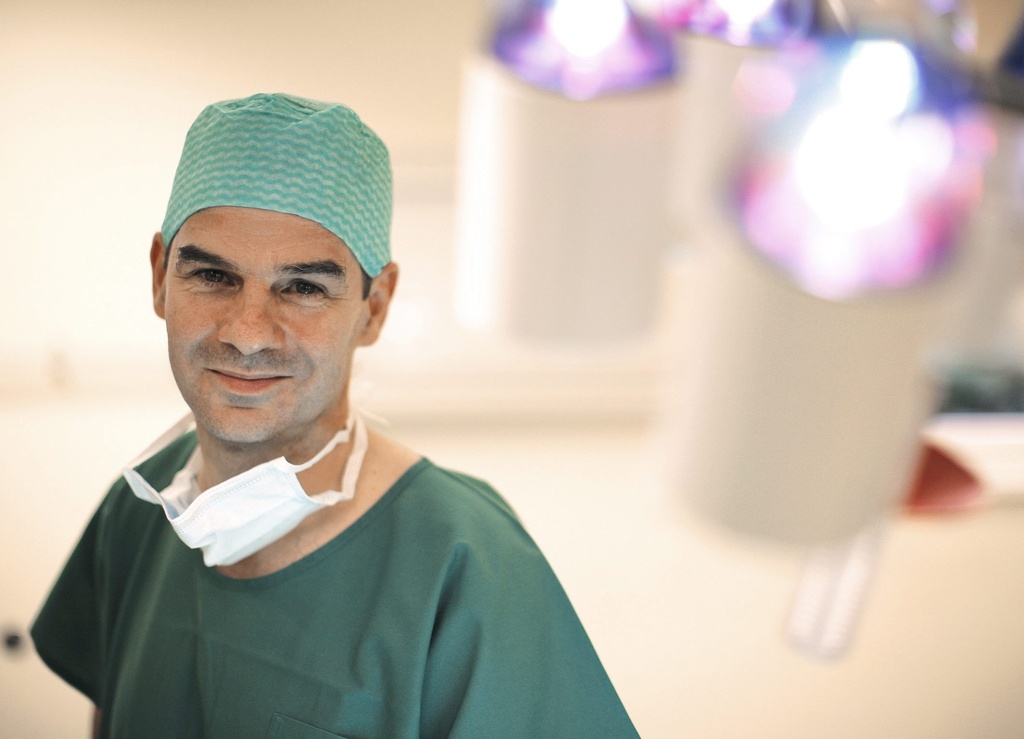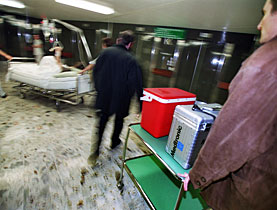Study urges new incentives for organ donors

A Swiss researcher has called for financial perks to counter a persistent shortage of organ donations in Switzerland.
About 1,000 people are currently on a waiting list for a transplant hoping to find donors willing to give up their organs upon death. Switzerland is near the bottom of the list of registered organ donors in comparison with European Union countries.
Mélanie Mader, who wrote her doctoral thesis at Neuchâtel University, points out that a shortage of organ donations is a public health issue and that it is up to the state to take measures.
However the authorities have no means at their disposal to encourage donations, despite a legal obligation to ensure a sufficient number of organs for transplants.
Although the general public has a positive attitude towards organ donations, very few people register as donors.
Mader blames this on a reluctance to consider one’s own death.
Discounts
Her proposals to amend the situation are primarily based on financial perks for donors.
She suggests considering the example of the Netherlands where people who agree to give up their organs benefit from a ten per cent discount on health insurance premiums.
Mader acknowledges that such a reduction is not very high, but she is convinced that it could help find donors.
The proposal has drawn mixed reaction.
The Santésuisse health insurance association described it as “interesting but very exotic and not very realistic”.
Spokeswoman Silvia Schütz told swissinfo.ch that it was not possible to give details about a possible impact of such a measure as the health insurers did not have the relevant information in their statistics.
However, Franz Immer, director of Swisstransplant, a foundation that promotes organ donations, is convinced that it would help save up to SFr1 billion ($950 million in health costs.
“The costs of a kidney transplant which allows two out of three patients to live up to 20 years would offset the cost of one year of dialysis treatment,” Immer says.
Funeral rebate
Immer also welcomes Mader’s suggestion to offer organ donors a discount on funeral costs, as practised in a trial in the state of Oregon in the United States.
A similar method is currently used by anatomy institutes in Switzerland to compensate people who leave their dead bodies for scientific research.
“We are keen on cooperation with the anatomy institutes. It is in our interest to harvest organs where people donated their bodies to research,” Immer explains.
He says the aim is to compensate the willingness and readiness to help other people and not to pay for an organ, which would be banned under law, according to Immer.
Preferential treatment
Mader’s suggestion also includes tax breaks for people willing to donate organs, but her first choice is to give them preferential treatment if they themselves happen to need, for example, a new kidney.
She does not propose to make it the main factor but would like to include it in the top four criteria for eligibility for an organ transplant.
“This is not compatible with Swiss law. Every person is equal and has the same right to an organ transplant,” says Immer.
Instead he proposes setting up a database of people not willing to give up their organs upon death – based on presumed consent.
However, Immer says such a method, introduced in several European countries, would not be easily accepted in Switzerland where people are particularly wary of having personal details registered by the authorities.
Theodor Weber of the Federal Health Office does not rule out presumed consent. He points out that it would take time for the population to accept such an opt-out solution.
“Those who don’t want to donate an organ do not have to say so under the current rules. The presumed consent method would reverse this,” says Weber.
The Health Office does not explicitly call for organ donations. “Of course we would welcome more donations,” says Weber.
He says the main problem is not so much a donor fatigue among the Swiss but making better use of the existing resources in hospitals.
Etienne Strebel, swissinfo (adapted from German by Urs Geiser)
397 organs were taken from dead people last year, of which 393 were successfully transplanted.
30 people received a heart
39 people received lungs
95 people received a liver
20 people received a pancreas
189 people received kidneys
By far the most common organ transplants in Switzerland are for kidneys, followed by operations for livers, hearts and lungs.
Operations are carried out in six hospitals across Switzerland, including Zurich, Geneva, Lausanne, Bern, Basel and St Gallen.
A controversy is underway over a centralisation of certain transplant operations, particularly for the specialised heart transplants.
Switzerland has followed a new framework for regulating transplants since July 1, 2007.
Under the regulations a person’s organs can be harvested after death only if consent is given beforehand.
The will of the dead person overrides the wishes of surviving relatives.

In compliance with the JTI standards
More: SWI swissinfo.ch certified by the Journalism Trust Initiative












You can find an overview of ongoing debates with our journalists here . Please join us!
If you want to start a conversation about a topic raised in this article or want to report factual errors, email us at english@swissinfo.ch.